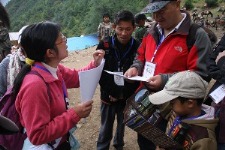
Ford Foundation Supports Global Environmental Leaders
IFP has provided access to higher education to over 4,000 people from marginalized communities in 22 countries on their paths to social change, including many who are spearheading innovative solutions to our global environmental problems.
- By Rachel Clift
- Apr 19, 2013
The Ford Foundation International Fellowships Program (IFP) – the largest single grant in the foundation’s history –is winding down its successful run after 12 years. This multi-million dollar global initiative has provided access to higher education to over 4,000 people from marginalized communities in 22 countries on their paths to social change, including many who are spearheading innovative solutions to our global environmental problems. From waste management systems in Mexico, to eco-tourism in China, to natural resource protection in the Himalayas and the Amazon, IFP alumni are a making huge difference.
Carmen Osorio Hernandez from Mexico, for example, coordinates the Atasta Peninsula Community Development Program, an organization that implemented an integrated waste management system in rural Mexico. Her system is currently empowering over 140 social groups, comprised of 120 community groups and families, 9 schools, 10 churches, and a health center. The program teaches them how to sort, classify, and measure solid wastes that would otherwise pollute their fragile ecosystem. The groups then sell the sorted waste, and decide collectively how to spend the profits, which in turn fosters a sense of ownership and community leadership.
In India, IFP alumnus Majoj Bhatt founded the nonprofit organization Research, Advocacy and Communication in Himalayan Areas (RACHNA) to empower his community to fight unsustainable exploitation of natural resources. RACHNA ensures that farmers and local residents have a voice when it comes to halting the unchecked environmental devastation in the region.
Yi Xiaohua works with The Nature Conservancy on solving waste problems in the Meli Snow Mountain National Park in China. This diverse area is home to a number of key conservation targets, including an evergreen oak forest, and also provides important habitats for a diverse range of wildlife including artiodactyls and pheasants. Because the closest road is over 7 miles away, trash removal is difficult. So Yi started and implemented a new “Low Impact Tourism” program that educates locals and tourists about conservation efforts to protect the park’s diverse flora and fauna.
And in Brazil, Francisco Kennedy Souza was recently named “Steward of the Forest” by the Rainforest Alliance and awarded the prestigious Kleinhans Fellowship by the international environmental organization. Now a Fulbright Scholar in the process of earning his PhD, Kennedy is working to enhance the managerial skills of community members in his home of Acre in order to help them preserve their natural resources and address deforestation. His efforts are expected to contribute directly to the well-being of approximately 9,000 families, and to the conservation of 2.96 million acres of forests in Western Amazonia.
By working closely with local partner organizations around the world, IFP was able to recruit and select candidates from underserved populations, where factors like ethnicity, gender, location, or disability often prevent access to advanced education opportunities that can lead to real social change and sustainable community development. Today, approximately 82 percent of IFP Fellows have returned home to implement what they have learned.
Carmen, Majoj, Yi, and Kennedy have a great deal to offer their communities, but because of socio-economic or other disadvantages, they may not have had sufficient access to higher education and the professional networks that helped them realize their full potential. With academic opportunity came a chance to make a lasting impact on the environment – at local and global levels.
IFP will officially be closing in September 2013, with the final group of Fellows enrolled in universities around the world completing their fellowships by the end of the year. As a result of this transformational program, the doors of higher education have been opened to a new generation of environmental leaders.
About the Author
Rachel Clift is the Communications Officer at Ford IFP in New York. An Emmy-nominated television producer, writer and documentary filmmaker, she has created award-winning programs for PBS and The Sundance Channel on social change issues ranging from organic farming to microfinance. She has also written and produced videos for numerous organizations including Habitat for Humanity, The Asian Development Bank, Women's World Banking, and Safe Water Network. She is a former community organizer.